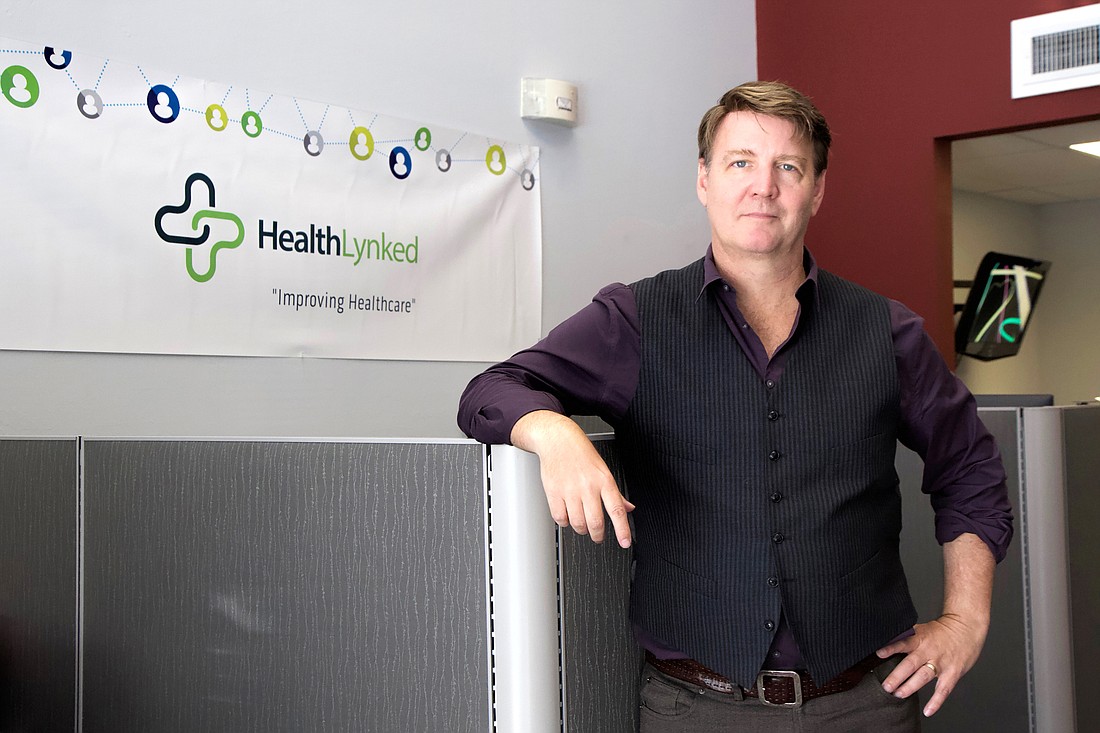- February 22, 2025
-
-
Loading

As a former women’s health medical practitioner, Dr. Michael Dent is at his core a physician on a mission to save lives. But rather than treating patients individually, he’s out to save them on a global scale.
That was his goal when he founded Fort Myers-based NeoGenomics in 2002: helping to grow the cancer diagnostics lab company from a $300,000 capital investment into publicly held company with $277 million in revenue in 2018. He says his newest venture, Bonita Springs-based HealthLynked, has even greater potential.
HealthLynked is first and foremost a technology company with an emphasis on health care by linking patients with providers on multiple levels through a cloud-based software platform, Dent, 55, says.
'We're not looking to change the dynamic of the doctor-patient interaction. We're looking to augment it. We’re looking to supplement, not replace.' — Dr. Michael Dent, HealthLynked
The company's system is capable of merging patients’ health records from a variety of sources into a comprehensive, portable, accurate health record instantly accessible by participating doctors who sign on to have the HealthLynked hub placed in their offices. Free to patient members, the service not only makes continually updated records accessible by physicians but also tracks every aspect of their patients’ visit.
And soon, an under-development artificial intelligence component will even provide diagnostic information based on factors including patient history, geography, environmental exposures and symptoms, providing the patient voluntarily maintains the profile.
The mission? Manage care, head off health issues before they present and create a connection beneficial to both patients and their providers. “We're not looking to change the dynamic of the doctor-patient interaction; we're looking to augment it,” says Dent, HealthLynked Chairman and CEO. “We’re looking to supplement, not replace.”
Founded in 2014, Dent and his management team made up largely of former NeoGenomics have raised $5.3 million in capital through private investments, an IPO and institutional funding. The trading volume, he says, is 300,000 shares over the counter, and in 2019 the company is on track to do — largely through two Naples medical practices it purchased to use as a test lab for the system — $5.3 million in revenue. The company posted $2.26 million in 2018 revenue, up 7% over $2.1 million in 2016.
The company is also eyeing the acquisition of one or two Florida accountable care organizations, which are networks of cost-conscious medical practices serving a minimum of 15,000 Medicare patients. That would add millions of dollars in revenue to the bottom line, HealthLynked officials say. The goal is to increase earnings enough to raise stock value to $2 a share and qualify for the Nasdaq. HealthLynked is currently traded over-the-counter, where, as of mid-July, its 52-week range in share price was $0.09 to $0.62.
Through its preferred provider program, for which practices pay $5,000 per year, HealthLynked has more than 500,000 patient members in Florida alone. Patients can sign up for free, fill out their medical history profile and use the system to find provider members. The profile remains the property of the patient and is separate from the practitioners. Standard federal HIPAA privacy standards apply.
The idea is to help patients be more proactive in their own health maintenance.
“We are at the core an AI company,” Dent says. “We're looking to develop artificial intelligence to manage health care data at multiple levels. We can look at half a million patients right now and start drawing conclusions based on environmental factors, geography and symptoms all combined. Once the personal health record is there, then our patients can have HealthLynked look at their record and provide an analysis, and that paradigm hasn’t existed before because the technology hasn’t been there.”
Similar to lab results but on a greatly advanced scale, HealthLynked will eventually be able to provide suggested diagnoses to physicians before an examination occurs. Of course, it remains up to the doctors to render a final opinion. “By law, computers can’t diagnosis,” Dent says.
HealthLynked currently employs 40, including the headquarters, the two medical practices it owns and seven India-based software developers. Dent says the company is about to outgrow its office off old U.S. 41.
Although free to them, patients joining the service and being driven toward preferred and in-network HealthLynked providers are crucial to the revenue stream paid by practitioner memberships. But in the end, Dent says it’s all about saving lives.
“To have a system to really manage care, you have to have the patient involved,” he says. “There is no doctor who will say, ‘I don't need to see you. I'll just manage your care.’ You have to ask questions every day because symptoms that might not have been there a week ago may show up this week, and that's why you have regular patient interaction with the system. Once you get that engagement, and that's the hardest part of it all, that's when AI really comes into play.”